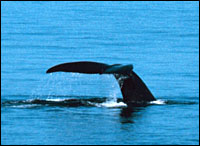
The U.S. Navy and environmental groups have reached a compromise in a long-running dispute over the Navy’s use of low-frequency sonar, which greens say can befuddle whales and sometimes cause them to beach and die. The Navy on Tuesday agreed to restrict use of low-frequency active sonar in areas known to be whale breeding grounds or key habitat. “We don’t have to choose between national security and protecting the environment,” says Michael Jasny of the Natural Resources Defense Council, saying the agreement “maintains the Navy’s ability to test and train, while shielding whales and other vulnerable species from harmful underwater noise.” Separate litigation over the Navy’s use of mid-frequency sonar is pending at the Supreme Court; greens say mid-frequency sonar is at fault for the Monday stranding and death of a whale on the Hawaiian island of Molokai, but a U.S. Pacific Fleet spokesperson objects that it’s “premature, speculative and irresponsible to link naval activities to this stranding.”


